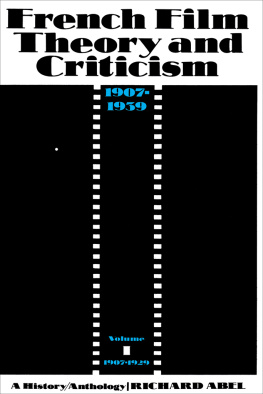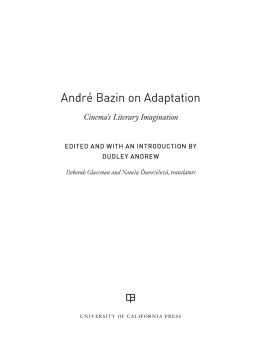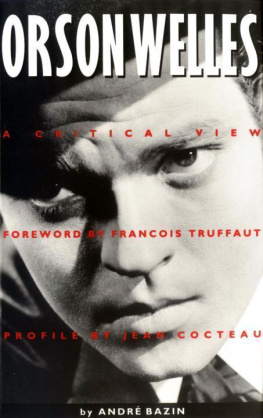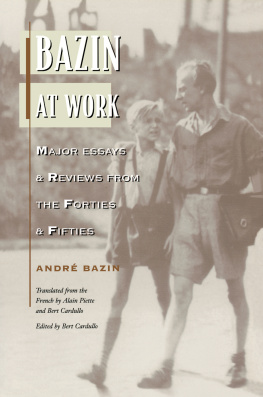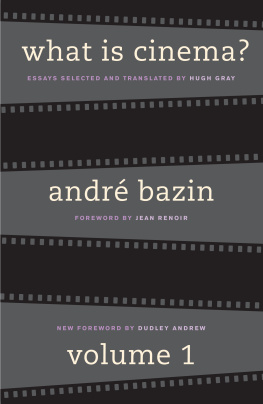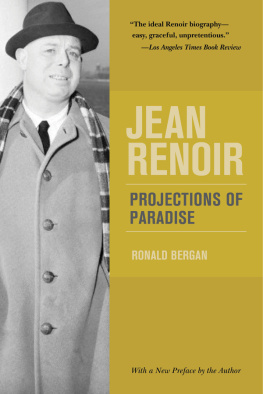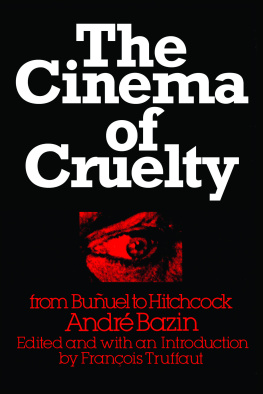WHAT IS CINEMA?
VOL. II
by ANDR BAZIN
foreword
by FRANOIS TRUFFAUT
new foreword
by DUDLEY ANDREW
essays selected and translated
by HUGH GRAY
UNIVERSITY OF CALIFORNIA PRESS
Berkeley Los Angeles London
UNIVERSITY OF CALIFORNIA PRESS
Berkeley and Los Angeles, California
UNIVERSITY OF CALIFORNIA PRESS, LTD.
London, England
1971, 2005 by the Regents of the University of California
Library of Congress Cataloging-in-Publication Data
Bazin, Andr.
What Is Cinema? / by Andr Bazin,
with a foreword by Franois Truffaut,
with a new foreword by Dudley Andrew,
essays selected and translated by Hugh Gray
p. cm.
Includes bibliographical references and index.
ISBN 0-520-24228-9 (v. 2 : alk. paper)
e-ISBN 9780520931268
1. Motion pictures. I. Title.
PN1994.B3513 2005
791.43dc22 2004049843
FOREWORD
by Franois Truffaut
ANDR BAZIN wrote about film better than anybody else in Europe. Fromthat day in 1948 when he got me my first film job, working alongside him,I became his adopted son. Thereafter, every pleasant thing that happenedin my life I owed to him.
He taught me to write about the cinema, corrected and published myfirst articles, and helped me to become a director. He died only a fewhours after I had finished my first days shooting. When, on being sent forby his friend Pre Lger, I arrived at his home in Nogent, he looked upat me but could no longer speak and was in acute pain. The previousevening he had been watching Le Crime de Monsieur Lange on televisionand making notes for the book he was preparing on Jean Renoir.
If I were asked to give a picture of Andr Bazin the first thing thatwould occur to me would be a caption from an American magazine: Themost unforgettable character Ive met.
Andr Bazin, like the characters in the plays of Giraudoux, was acreature from the times before Original Sin. Although we all knew him fora good and honest man, his goodness was nevertheless an endless surprise,so abundantly was it manifest. To talk with him was what bathing in theGanges must be for a Hindu. Such was his generosity of spirit that I sometimesfound myself deliberately running down a common acquaintancejust for the pleasure of hearing Andr defend him.
While he had a heart as big as a house he was also logic itself, a beingof pure reason and a superlative dialectician. He had complete faith in thepower of argument and I have seen him win over the toughest policeman,being helped rather than hindered by a stammer thanks to which he wasable to rivet peoples attention. He would expose a dishonest argument byfirst taking over his adversarys thesis, developing it better than had theman himself, and then demolishing it with rigorous logic. Only in thearticles of Sartre, whom Bazin particularly admired, does one find acomparable intelligence and similar intellectual honesty.
His chronic physical ill health was paralleled by his constantlysurprising moral strength. He would borrow money aloud but lend it with awhisper. In his presence everything became simple, clear, and aboveboard.Since he considered it wicked to ride in a four-seat car all alone, heoften picked up three other people at the bus stop in Nogent, whom hewould then drop off along his route in Paris. Whenever he and his wifeand small son went away for a few weeks he would look about among hisinnumerable friends for a couple not so comfortably housed to whom hecould lend his house, and then find someone to lend his car to.
He loved the cinema, but still more he loved life, people, animals, thesciences, the arts; just before he died he planned to make a short filmabout the little known romanesque churches of France. He kept all sortsof pets, a chameleon, a parrot, squirrels, tortoises, a crocodile and othercreatures I cannot list because I dont know how to spell their names; notlong before he died, he had been force-feeding some kind of lizard, aniguana from Brazil, stuffing pieces of hard-boiled egg into its mouth witha little stick. Im afraid, he said, that Ill die before this poor creaturedoes.
Whether the world be good or evil I cannot say, but I am certain thatit is men like Bazin who make it a better place. For, in believing life tobe good and behaving accordingly, Andr had a beneficial effect on allwho came in contact with him, and one could count on the fingers of onehand those who behaved badly toward him. Everyone who ever talkedwith him, even if only once, could call him their best friend, since inmeeting him, overwhelmed by such integrity, it was impossible not to givethe best that was in one.
Andr Bazin was too warm a person to allow us to use such hollowphrases about him as living still or still in our midst, and so on. Thecruel, the truly desolating, the profoundly sad fact is that he is dead. Allwe can do is to weep and reread him. Not long ago I came across apassage in a letter of his that characterizes his critical approach: Imsorry I couldnt see Mizoguchis films again with you at the Cinmathque.I rate him as highly as you people do and I claim to love him themore because I love Kurosawa too, who is the other side of the coin:would we know the day any better if there were no night? To dislikeKurosawa because one loves Mizoguchi is only the first step towardunderstanding. Unquestionably anyone who prefers Kurosawa must be incurablyblind but anyone who loves only Mizoguchi is one-eyed. Throughout thearts there runs a vein of the contemplative and mystical as well as anexpressionist vein.
CONTENTS
FOREWORD TO THE 2004 EDITION
By Dudley Andrew
I.
IS IT POSSIBLE THAT Andr Bazins personality has gotten in the wayof the ideas he promulgated? Franois Truffauts touching forewordto this volume calls him a creature from the times before Original Sin.Hugh Gray urges us to read him as a modern St. Francis whose naturalgenerosity, modesty, and humor are the virtues of a born critic. ForJean Renoir, Bazin is both poet and saint, one whose words, broadcastacross a pure frequency, will survive after the noise of the power mongersin this feudal age of film has been filtered out by the sieve of history.My foreword to Volume I employs Renoirs sieve to cull a pureBazin, the essential strains of his abundant ideas. After all, for Quest-ceque le cinma? Bazin effectively filtered sixty-five of his own piecesfrom the several thousand he had written. And Hugh Gray clarified thisfurther in choosing twenty-six items for these two English volumes.
This timeless Bazin, reduced over the simmering flame of debateto a key set of principles, attitudes, and predilections, has served thosewho would use or abuse him to flavor their own recipes for cinema.Moreoverand this must surely be uniquethe Bazinian essence hasbeen celebrated and emphatically quoted within movies. As the openingcredits of Contempt (1963) conclude and Raul Coutard, astride hisCinemaScope camera, wheels to look down directly at the audience,Jean-Luc Godards voice delivers his films epigraph: Cinema, saidAndr Bazin, replaces our gaze with a world that conforms to our desires.... Contemptis the story of that world. The second instance,more recent, comes dead-center in Waking Life (2001) in the nodalchapter that director Richard Linklater labeled The Holy Moment.On a movie screen watched by the films perplexed hero, an agitatedexperimental cineaste, Caveh Zahedi, pits Bazin against the degradedstate of contemporary cinema of spectacle and story. Zahedi asserts thatfilm renders the sanctity of everyday occurrences here and now: Theontology of film... is about [a particular] guy at that moment in thatspace.... For Bazin the Christian, film is like a record of God or ofthe face of God or of the ever-changing face of Gods manifestations.


